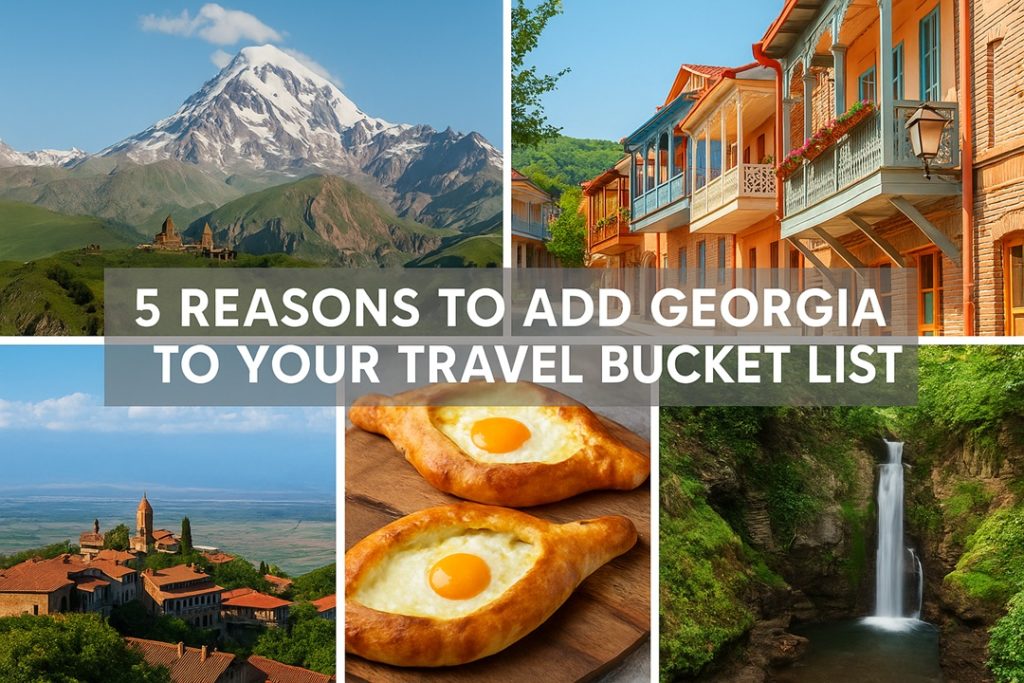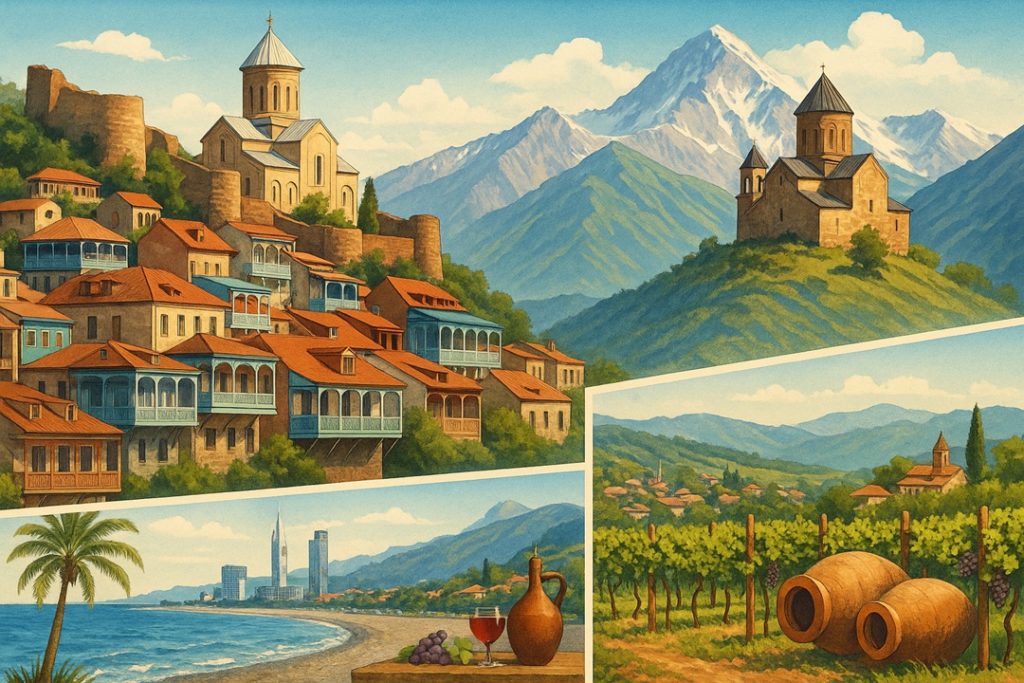
There are countries you hear about all the time but never quite picture properly until you set foot there yourself. Georgia is one of those places. For some, it’s all about khinkali dumplings and khachapuri bread; for others, it’s the dramatic mountains and the Black Sea; and for many, it’s the legendary wine and long toasts. But all of that is only scratching the surface. Once you arrive, you quickly realise that Georgia surprises you at every corner.
It may be small on the map, yet Georgia feels vast in experiences. Within a few hours you can go from palm-lined beaches on the Black Sea to snow-capped peaks in the Caucasus, from medieval monasteries to buzzing wine cellars, from sleepy villages to the lively streets of Tbilisi. One morning you might watch the sunrise over Mtskheta, have lunch in a family-run vineyard in Kakheti, and round off the day on Rustaveli Avenue with music drifting from the bars.
So why should Georgia be on your bucket list? There are five reasons, and each one on its own is strong enough to justify the trip.
Reason 1. Nature you won’t find anywhere else – from the Black Sea to the Caucasus peaks
The first thing that takes your breath away in Georgia is the sheer variety of its landscapes. In the west you’ll find a mild subtropical climate, palm trees and lush forests. Travel east, and you’re among dramatic mountain passes, crisp air and high snow-covered ridges.
On the coast, Batumi is the most famous resort town. There’s a long seafront boulevard, a mix of old quarters and glassy new towers, pebble beaches and a botanical garden spread across the hills. But drive just half an hour inland and you’re in the mountains of Adjara, where rivers rush through valleys, waterfalls tumble down rocks and small villages sit tucked into the greenery.
Head north and the road to Kazbegi (officially Stepantsminda) is one of the most beautiful drives in the country. Along the Georgian Military Highway you’ll pass Ananuri Fortress, the turquoise waters of the Zhinvali Reservoir and endless views of snowy summits. The highlight is the Gergeti Trinity Church, perched at over 2,000 metres beneath Mount Kazbek. You can hike up or take a jeep, but nothing beats the view once you’re up there.
Another region that feels like another world is Svaneti. Villages like Mestia and Ushguli are famous for their medieval watchtowers. Life here hasn’t changed much for centuries, and the whole area is recognised by UNESCO. The road is winding, but the reward is stepping into a part of the Caucasus that feels timeless.
For hikers, national parks offer endless trails. Borjomi-Kharagauli National Park is one of the largest in Europe, with routes ranging from a couple of hours to several days. Tusheti, accessible only in summer via the Abano Pass, is a land of untouched villages, eagles overhead and valleys stretching into the distance.
Georgia is the kind of place where you can watch the sunrise on the coast and by lunchtime find yourself on a mountain ridge. Few countries offer that contrast.
Reason 2. Food and wine – flavours that stay with you
Ask anyone who has visited Georgia what stood out most, and the answer is often the food. Georgian cuisine is not just about taste; it’s about atmosphere, hospitality and tradition.
Khachapuri, the cheese-filled bread, comes in many styles: Adjarian with a runny egg and butter, Imeretian as a simple round pie, or Megrelian with double cheese. Khinkali dumplings are a must – plump, juicy parcels of meat with broth inside, eaten by hand with a little twist at the top.
But meals in Georgia are not just meals. They’re gatherings. A supra, or traditional feast, can last for hours, with a tamada (toastmaster) leading the toasts – to family, to peace, to love. Every toast has meaning, and the sense of being welcomed into the group is unforgettable.
Georgia is also one of the oldest wine-making regions in the world. In Kakheti, wine is still made in clay vessels called qvevri buried underground. Many families produce their own wine for friends and neighbours. For visitors, it’s a chance to see winemaking done the way it’s been for thousands of years. At the same time, modern wineries are thriving too, offering tastings that rival anything you’d find in Europe.
And then there’s chacha – the fiery local spirit. It’s poured with a smile at the end of a meal, and while strong, it feels more like a gesture of friendship than just a drink.
The flavours of Georgia linger long after you leave. You may find yourself back home dreaming of khinkali or wishing you could open a bottle of Kakhetian wine again.
Reason 3. Culture and history at every step
Georgia’s history runs deep. Christianity was adopted here in the 4th century, and ancient churches and monasteries still dominate the landscape.
Overlooking the town of Mtskheta is Jvari Monastery, built in the 6th century. From its hill you can see the confluence of the Aragvi and Mtkvari rivers – one of the most iconic views in the country. In Mtskheta itself stands Svetitskhoveli Cathedral, the spiritual heart of Georgian Orthodoxy.
Further north, the Gergeti Trinity Church near Kazbegi is another icon. Built in the 14th century, it stands alone against the backdrop of the mountains. Pilgrims and tourists alike make the journey here.
The cave cities are another window into Georgia’s past. Vardzia, carved into the rock, is a complex of rooms, tunnels and churches. Older still is Uplistsikhe, once a hub of ancient trade routes, where you can still walk through stone halls and amphitheatres.
Tbilisi itself tells the story of old and new. Wooden balconies in the old town overlook narrow lanes, while just a short walk away stands the glass-and-steel Bridge of Peace. Theatres, museums and street art show that this is a city that lives in both its history and its present.

Reason 4. People and hospitality – the heart of Georgia
Mountains and monasteries impress, but most visitors will tell you it’s the people that make Georgia unforgettable.
The Georgian saying goes: “A guest is a gift from God.” It’s not just words. Taxi drivers might walk you to the exact door if you can’t find it. Guesthouse owners often set out fruit or pour you a glass of wine just to make you feel at home. At markets, it’s not unusual for vendors to slip an extra peach into your bag with a wink.
The supra captures this spirit. Around the table, with wine flowing and songs breaking out, the sense of community is as real as the food itself.
It’s this openness and warmth that travellers carry back with them. Even if you miss a few sights, it’s the human connections that stay.
Reason 5. Travelling around is easy and affordable
Georgia is surprisingly easy to get around. Trains, minibuses and buses connect the main cities, but nothing beats the freedom of having your own wheels. With a car, you can explore remote monasteries, stop in villages and take mountain roads at your own pace.
For those starting in the capital, car rental in the centre of Tbilisi is a convenient way to set off. Prices are reasonable, the roads are generally good, though in the mountains you’ll want to take care.
Travelling here is also affordable. A night in a guesthouse with breakfast often costs less than a dinner out in Western Europe. Food, transport and accommodation are budget-friendly, and the experience feels rich in every sense.
Visas aren’t an issue for most travellers – many can stay up to a year visa-free. Internet is fast and cheap, SIM cards are easy to pick up at the airport, and English is increasingly spoken in cities and tourist areas.
Day trips and short adventures
Georgia is perfect for day trips.
From Tbilisi, Mtskheta is just 20 kilometres away – a former capital and spiritual hub. Heading north you’ll pass Ananuri Fortress on the way to Kazbegi. From Kutaisi you can visit Gelati Monastery or the Prometheus and Sataplia caves. From Batumi, you can escape to the Adjara mountains or spend the day in the botanical garden.
Each trip takes only a few hours, but feels like a journey into another world.
When to visit
Georgia offers something in every season.
Winter is for skiing in Gudauri and Bakuriani. Spring brings blossom to the valleys. Summer is the time for beaches, hiking and green mountains. Autumn is wine season, with golden vineyards in Kakheti and festivals across the country.
Do check the conditions: summer in Tbilisi can be hot, while in winter mountain passes are often closed by snow.
Tips for first-time visitors
- Entry: Most visitors don’t need a visa, and many can stay up to a year.
- Money: The local currency is the lari. Cards are widely accepted, but carry cash in rural areas.
- Safety: Georgia is generally safe, even for solo travellers.
- Language: In cities English is common, while older generations often speak Russian.
- Internet: Buy a local SIM card at the airport – data is cheap and coverage is strong.
Afterword
Georgia is a country where each of the five reasons could justify the trip on its own. But together they create something truly special.
The landscapes – from beaches to mountains. The food and wine – unforgettable flavours. The culture and history – ancient monasteries, cave cities, modern Tbilisi. The people – open-hearted and welcoming. And the ease of travel – making it simple to explore freely.
All of this makes Georgia a place you don’t just visit once. It’s a country that pulls you back, because every season and every journey reveals a different Georgia.











































































